|
Safety, Dreams and Peace of Mind (Originally published on SpokaneFavs)
How good we feel when we wake up is correlated with how well we sleep and the contents of our dreams. How well we sleep and dream is related to our peace of mind and level of anxiety. Recent research put it this way, “Waking mental well-being is assumed to be tightly linked to sleep and the affective content of dreams. Healthy participants completed a well-being questionnaire, followed by a three-week daily dream diary and ratings of dream affect [positive or negative]. Multilevel analyses showed that peace of mind was related to positive dream affect, whereas symptoms of anxiety were related to negative dream affect. We propose that whereas anxiety may reflect affect dysregulation [imbalance] in waking and dreaming, peace of mind reflects enhanced affect regulation in both states of consciousness. Finally, our study shows that peace of mind complements existing conceptualizations and measures of well-being.” (Sikka, P., H. Pesonen, et al. (2018). "Peace of mind and anxiety in the waking state are related to the affective content of dreams." Sci Rep 8(1): 12762. [Full Text] https://www.nature.com/articles/s41598-018-30721-1.pdf This idea of a correlation between sleep, well being and peace is reflected in several languages including Lango, a Southern Luo dialect spoken by the Lango people of Uganda and the Sudan. Here are some words for peace in Lango: "Kuc" (peace) "Kuch" (to be quiet, to be at peace), "Kweo" (to make cool, to pacify), "Ayom" (soft, peaceful), "Morembe Ayom" (greeting), and "Buti Ayom" (sleep softly, well). Sleep Peacefully In the Lango language of Uganda and Sudan “ayom” means soft and peaceful "buti ayom" is to sleep softly and well “morembe ayom" is a greeting a wish of peace for the morning of well being after sleeping softly Another Lango word "kuc" means peace "kuch" is to be quiet to be at peace both words correlating peace and quiet may we each experience “ayom” and “kuc” peace, sleep and well being In Bambara another language of Africa sleep and peace are correlated more directly in a common morning greeting. "Hèrè " and "Errébé" mean peace in this language of Mali. Sleep Peaceful Good Morning In Bambara, the language of Mali in West Africa the way you say good morning "Hèrè sira wa?" means did you sleep in peace often the answer is "hèrè dogon" or peace only Similar in the Dyula of West Africa did you sleep in peace? is "hèrè sirawa?" and peace only is "hèrè dron" Try this. Each morning for a few days, wake up and say to yourself out loud or to another person, "Good morning Peace!" in English or another language. In your mind and with your words, frame your day as one with peaceful relationships intertwines with inner peace. A common northern Somali greeting is “Ma nahad baa” or “is there peace.” In Somali spoken in Somalia, Djibouti, and Ethiopia, the word for peace is “Nabáda.” “Nabadda maanka” is peace of mind. Found Poetry The following poem is what is called a found poem, meaning the words were found in an essay or some other form of writing then teased out to create a poem. The order of the words can be changes in the process and sometimes the whole meaning of the essay can be different in the poem. Sometimes a found poem distills the words already written on a page, up to their essence. This is also what is known as a Persona poem or a poem written by a poet but from another person’s point of view. Trying literally to walk in another person’s words or trying to share another’s point of view while inhabiting their own body and experience. Mohamed Maine Seed The proud son of Somali immigrants traversed oceans and continents to escape brutal civil war seeking the American dream for themselves and their children enduring hardships discrimination, poverty and violence struggling to understand who I am where do I belong we were too Somali too Muslim Black Foreign the American Dream out of reach but incredible friends and mentors pushed me to think otherwise I have a place in this country with good people including diversity and the freedom to be who you are in a better place I hope one day to welcome the schoolgirl from Syria the young entrepreneur from Iraq the old poet from Somalia where we have a Somali proverb when we see injustice “Dhiiga kuma dhaqaaqo?” “Does your blood not move?” I am moved. Capturing a similar dream for all Africa, Nelson Mandela said, “I dream of an Africa which is in peace with itself.” May we all find peace as we sleep, dream, and in all our waking hours with the help of words from our own native tongue and the African languages of Lango, Bambara, and Somalia. Sleep Peaceful Good Morning In Bambara, the language of Mali in West Africa the way you say good morning "Hèrè sira wa?" means did you sleep in peace often the answer is "hèrè dogon" or peace only Similar in the Dyula of West Africa did you sleep in peace? is "hèrè sirawa?" and peace only is "hèrè dron" Exercise Each morning for a few days wake up and say to yourself or out loud or to another person, "Good morning Peace!" in English or another language. In your mind and with your words, frame your day as one with peaceful relationships and inner peace. Originally posted on SpokaneFavs: Safety, Dreams and Peace of Mind ... How good we feel when we wake up is correlated with how well we sleep and the contents of our dreams. https://spokanefavs.com/safety-dreams-and-peace-of-mind/
0 Comments
In Dutch “vrede” means peace
spoken in Holland or the Netherlands In Danish “vrede” means angry spoken in Denmark Maybe how much peace we have is influence by how we resolve our anger.
Danish (dan) ▲ Dansk (dan-000), Rigsdansk, an Indo-European language—"Fred" (peace), "Ro" (peace), "Sindsro" (peace), "Sjælefred" (peace), "Friður" (peace), "Vrede" (angry)—Denmark, Greenland.
#peacein10000languages #peaceofmind
"Nagaya" is peace in Afar, also known as Oromo, a language of Ethiopia, Eritrea, Djibouti, Kenya, East Africa, and the Horn of Africa. A common greeting is “bultiin isaanii nagaya?” (is your night peaceful?) to which the common answer is "nagaa keessa walgarra" (we see one another in peace). Think about how you greet people and how you respond to their questions about your sleep, your health, your mood, etc.
Afar: Qafár af (aar-000), Afar, Oromo, Afaraf, Danakil, Denkel, `Afar Af, Adal, Afaraf, Qafar, Qafar af, ʿAfár af, Aussa, Ba'adu, Central Afar, Northern Afar, Baadu, Adal, Affar, Affarigna; Dialects: Northern Afar, Central Afar, Aussa, Baadu (Ba`adu), a Afro-Asiatic, Cushitic, Eastern, Lowland Semitic language--"Salaamata" (peace), "Nagaya" (peace), "Nagaa" (peace), "Nagaa keessa walgarra" (we will see one another in peace)—Ethiopia, Eritrea, Djibouti, Kenya, East Africa, and the Horn of Africa—Djibouti (Jībūtī, جيبوتي, Djibouti), Eritrea (Iritriya, إرتريا, Erta, ኤርትራ), Ethiopia (Ityop'ia, ኢትዮጲያ, ኢትዮጵያ) (Lowlands of Ethiopia), Somalia (Soomaaliya, aş-Şūmāl, الصومال), Oromia, Kenya, East Africa, Horn of Africa. Djibouti (Jībūtī, جيبوتي, Djibouti), Eritrea (Iritriya, إرتريا, Erta, ኤርትራ), Ethiopia (Ityop'ia, ኢትዮጲያ, ኢትዮጵያ) (Lowlands of Ethiopia), Somalia (Soomaaliya, a؛-ھūmāl, الصومال), Oromia, Kenya, East Africa, Horn of Africa.
Except from The Meaning of Peace in 8000 Languages.
We are looking for grant money to finish this Peace Project. The goal of the book is to find and understand the word for peace in 8000 languages including the languages of North American Native Americans, Caribbean populations, Central Americans, South Americans, people of the Arctic, Europeans, Central Asians, Middle Easterners, Asians, Oceanic people, Polynesians, Melanesians, Australians, New Zealanders, people of Papua New Guinea, and Africans. Dictionary poetry is poetry create from dictionary entries, example sentences, definitions, and meanings. The dictionary can be monolingual, bilingual, or multilingual. Resources: Stop War, Say Peace: Pace سلام שלום Hasîtî शान्ति Barış 和平 Мир http://www.columbia.edu/~fdc/pace/ Awakenings: Peace Dictionary, Language, and the Mind (A Daily Brain Health Program) by Kimberly Burnham and the Creating Calm Network Publishing Group B07KDZGSJM eBook $4.99 paperback $14.95 https://www.amazon.com/Awakenings-Dictionary-Language-Health-Program-ebook/dp/B07KDZGSJM/ref=as_sl_pc_qf_sp_asin_til?tag=creatingcalmn-20&linkCode=w00&linkId=e146232c362c0fae93375501741f2bf3&creativeASIN=B07KDZGSJM
Ethiopia: Languages of Ethiopia (Amharic, Tigrigna, Orominga, Guaragigna, Somali, Arabic, English, over 70 others; Oromo (official working language in the State of Oromiya) 33.8%, Amharic (official national language) 29.3%, Somali (official working language of the State of Sumale) 6.2%, Tigrigna (Tigrinya) (official working language of the State of Tigray) 5.9%, Sidamo 4%, Wolaytta 2.2%, Gurage 2%, Afar (official working language of the State of Afar) 1.7%, Hadiyya 1.7%, Gamo 1.5%, Gedeo 1.3%, Opuuo 1.2%, Kafa 1.1%, other 8.1%, English (major foreign language taught in schools), Arabic (2007 est.)
Eritrea: Languages of Eritrea (Afar, Arabic, Tigre, Kunama, Tigrinya, Eritrean English (eng-027), other Cushitic languages. Eastern Cushitic Languages). Djibouti: Languages of Djibouti (French and Arabic (both official), Somali, Afar)
Susan Ives plans to save the world and create world peace with whirled peas, the title of her vegan cook book.
"Cooking and sharing vegan meals is a spiritual practice of mindfulness and compassion. It is sometimes hard to remember that food is made of air, water, sun and soil; it is hard to remember the labor of the bees, the birds and the farmers; it is hard to remember the very miracle of food when it comes from a box, a can or a take-out window. It is hard to remember that a cow or a pig or a chicken or a salmon was a living, breathing sentient creature when we purchase a shrink-wrapped, sanitized Styrofoam tray in a grocery store. The discipline of preparing fresh food reconnects us with the earth. The discipline of preparing a meal free of animals products is a reminder of our special connection with all other thinking and feeling beings. This book contains 116 recipes that will inspire you to create peace, salad, compassion, potatoes, courage, soup and community." - Susan Ives.
Docile Peace
Is calm and peaceful the same as meek and docile? It is in Cocama spoken in Peru, Colombia and Brazil "Iyuru" is to be meek and docile calm and peaceful Cocama (cod), Cocama-Cocamilla, or Kokama--Cocama (cod), Cocama-Cocamilla, Kukama-kukamiria, or Kokama—"Iyuru" (to be meek, docile, calm, peaceful), "Era" (good), "Chinta" (silent), "Chinta-puri" (be silent), "Uwaka-pa" (become) + "Era" (good), "Uwakapera" (totally transformed, become good)—Peru, Colombia and Brazil. Cocama-Cocamilla Quotes "Awa ɨyurun tɨma ikua yumɨra" he who is tranquil does not know how to rage or in Spanish "ya se ha hecho manso" "Wa ɨyurun tɨma ayukaka" people peaceful does not fight or In Spanish "la gente pacifica no pelea" Other languages of Colombia Other languages of South America
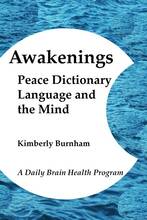 SpokaneFavs: Safety, Dreams and Peace of Mind ... How good we feel when we wake up is correlated with how well we sleep and the contents of our dreams [Read more] https://spokanefavs.com/safety-dreams-and-peace-of-mind/ Hèrè in Bambara "Hèrè" (peace), "Hɛrɛ", "Errébé"."Hèrè dogon" (peace only) in Bambara (bam) or Bamanankan spoken in a Mande language spoken in Mali, Burkina Faso and Côte d'Ivoire, Senegal, Gambia, Guinea, Sierra Leone and Ghana. Kuc in Lango (Uganda, Sudan). "Ayom" (soft, peaceful), "Morembe Ayom" (good greeting), "Buti Ayom" (sleep softly, well), "Kuc" (peace), "Kuch" (to be quiet, to be at peace), "Kweo" (to make cool, to pacify) in Lango, a Southern Luo dialect spoken by the Lango people of Uganda and the Sudan. Nabáda in Somali (Somalia, Djibouti, Ethiopia) "Nabáda" (peace), "Nabad" (peace), “Ma nahad baa” (is there peace), “Nabadda maanka” (peace of mind) in Somali spoken in Somalia, Djibouti, Ethiopia. Somali is the official language of Somalia. It is spoken by the Somali people, the largest ethnic group living in the country. The Somali language is an Afro-Asiatic language that belongs to the Cushitic branch of languages. The Saho and the Afar languages are its closest relatives. As of 2006, Somalia houses about 8.3 million of the 16.6 million speakers of Somali. A common northern greeting is ‘Ma nahad baa’ (Is there peace). 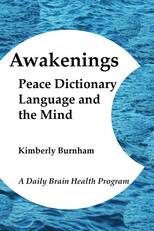
Vrede in Afrikaans
"Vrede" (peace), "Vreedsaamheid", "Sekerheid", "Doodskiet" (calm), "Gerus" (calm), "Gemoedsrus" (peace of mind), "Harmonie" (peace), "Kalm" (calm, tranquil), "Kalmeer" (calm), "Kalmte" (peace), "Pouse" (calm, tranquility), "Rus" (calm, tranquility), "Rustigheid" (peace) "Sekerheid", "Slag" (calm), "Stilstand (calm, tranquility), "Stilte" (peace), "Veiligheid" (peace), "Verneder" (calm), "Verslaan" (calm), "Vrede" (peace), "Vreedsaamheid" (peace), in Afrikaans (afr) close to Dutch spoken in South Africa, Botswana, Malawi, Namibia, Swaziland and Zambia. "Goeiemôre Môre Vrede" (good morning peace). Peace is a South African Town "Vrede" is a South African town 60 km south of Standerton 216 km south-east of Johannesburg founded on the farm Krynauwslust in 1863 proclaimed a town 16 years later "Vrede" is peace in Afrikaans one of 11 offical South African languages the name stuck to the town afrter the settlement of a dispute over the proposed site of the town Vredefort another South African town 15 km south-west of Parys 76 km north-north-east of Kroonstad laid out on the farm Vischgat in 1876 proclaimed 5 years later called Vredefort or Fort of Peace "Vredenburg" formerly known as "Procesfontein" or lawsuit fountain 165 km north-north-west of Cape Town 11 km north-north-east of Saldanha given the name Town of Peace in 1875 "Vrede" is also peace in Dutch [More Exercises]
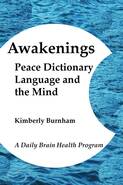
Alaafia in Yoruba (Nigeria)
"Àlàáfíà" (peace, sound health or well-being), "Ìrèlè" (peace), "Itunu" (peace of mind), "Ifaiya" (alignment, as being aligned with one's destiny or ultimate purpose in life), "Ifaiya bale" (peace, the practice of peaceful volition and absolute non-violence) in Yoruba (yor), Yorùbá or Youruba spoken in Nigeria, Benin, Togo (West Africa). From the Tongue to Ultimate Purpose in Yoruba (Nigeria) We have a saying in Yoruba spoken in Nigeria "In order to bring about peace, first bring peace to your tongue" There is peace "àlàáfíà" and "ìrèlè" and other Yoruba words explain the concept of peace "idera" or comfort "itunu" peace of mind "itelorun" conveys contentment "ifokanbale" as the mind rests in a place without worry "àlàáfíà" translated peace as well as sound health or well-being and a beautiful word "ifaiya bale" succinctly mulling over the practice of peaceful volition and absolute non-violence integrated into this gentle peaceful word "ifaiya" is alignment as in being aligned with one's destiny or ultimate purpose in life as if only through peace we each attain purpose in our life More Exercises Notice the relationship today between the things you say and your sense of accomplishment. Peace Word of the Day #peace #brain #Alzheimers #memory #travel #language #exercises #health
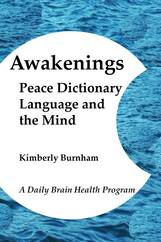 This list is constantly being updated. Language—"word" (peace)—Country. I am trying to make it as comprehensive and accurate as possible. Contact Kimberly Burnham with any questions, comments, corrections or additional words.
|
Medium Blog
Home of the Daily Peace Challenge. Learn about world peace - one word and one language at a time. (c) Kimberly Burnham, 2022 The Meaning of Peace in 10,000 Languages Looking for grant money to complete this peace project
Kimberly Burnham, PhD (Integrative Medicine)
860-221-8510 phone and what's app. Skype: Kimberly Burnham (Spokane, Washington) NerveWhisperer@gmail.com Author of Awakenings, Peace Dictionary, Language and the Mind, a Daily Brain Health and P as in Peace, Paix and Perdamiam: an Inner Peace Journal To Stimulate The Brain Kimberly Burnham, The Nerve Whisperer, Brain Health Expert, Professional Health Coach for people with Alzheimer's disease, Memory Issues, Parkinson's disease, Chronic Pain, Huntington's Ataxia, Multiple Sclerosis, Keratoconus, Macular Degeneration, Diabetic Neuropathy, Traumatic Brain Injuries, Spinal Cord Injuries, Brain Health Coaching ... Contact Kimberly Burnham in Spokane Washington (860) 221-8510 NerveWhisperer@gmail.com. Chat with Kimberly about Parkinson's, Poetry or other Brain related issues.
Not Taking Advantage of Your Amazon Author's page?
Kimberly Burnham helps authors get their books out into the world more broadly by improving their free Amazon Author's page and book pages, posting a book review on her blog and on her LinkedIn Pulse blog (over 12,000 followers) Promotion packages start at $50. Contact her at NerveWhisperer@gmail.com. See her Amazon Author's Page. See her list of publications including her latest book of brain health meditations, Awakenings: Peace Dictionary, Language and the Mind, a Daily Brain Health Program. 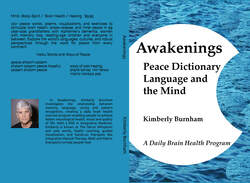 Look Inside on Amazon Look Inside on Amazon
Now Available: AwakeningsPlease share and write a review on Amazon.
Poet-In-Residence Position
I am looking for guest blog opportunities and a position as poet-in-residence. My current project is writing dictionary poems using words in different languages for the English word "peace." You can read some of my poems on Poemhunter . As poet-in-residence I would write poems on different words in different languages and broadcast them throughout the social media blogosphere. Each poem would link back to your site where the word or language appeared. I would expect some sort of stipend and a six month to one year placement. Please contact me for details if your organization is interested in having a poet-in-residence to help get your message out. Nervewhisperer@gmial.com Buy the print or eBook, review Awakenings then contact Kimberly for a free 20 minute brain health consultation. Email or Phone
(Regular rates $120 per hour or 10 sessions for $650.) (Integrative Medicine)
|
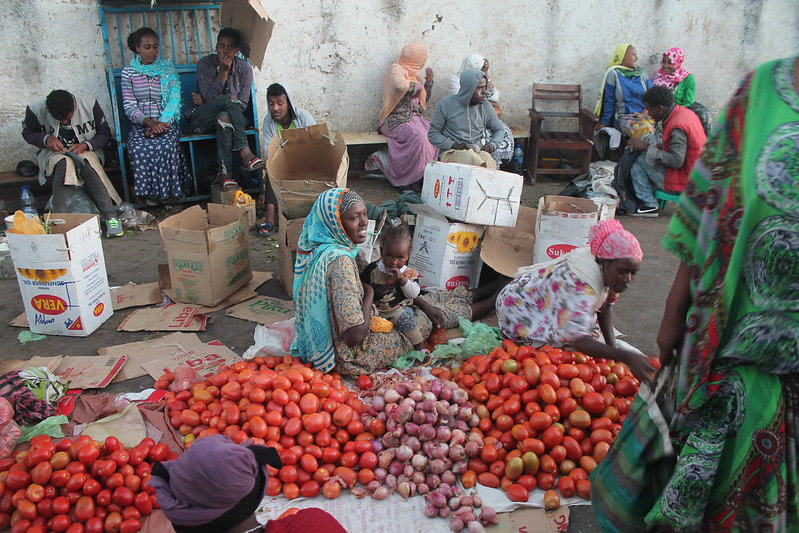
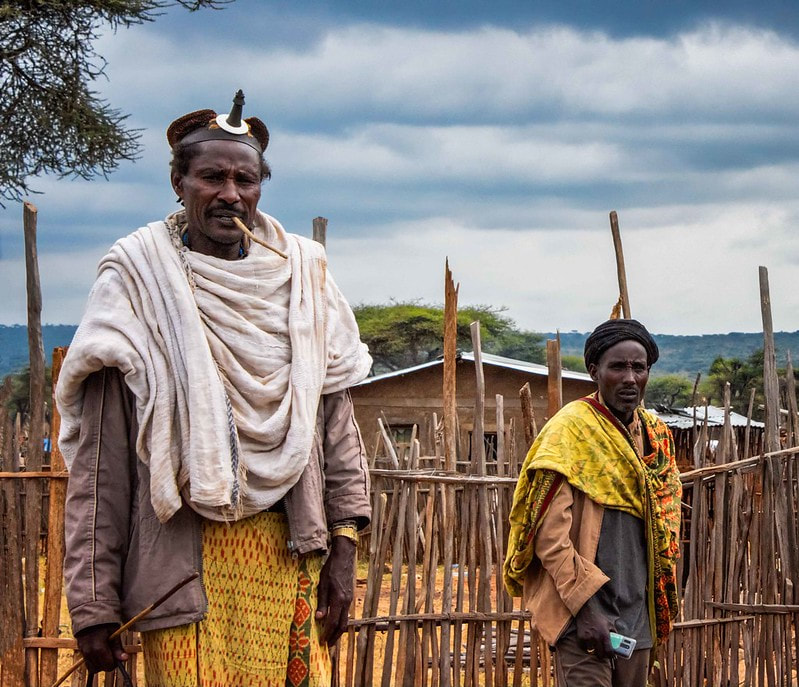
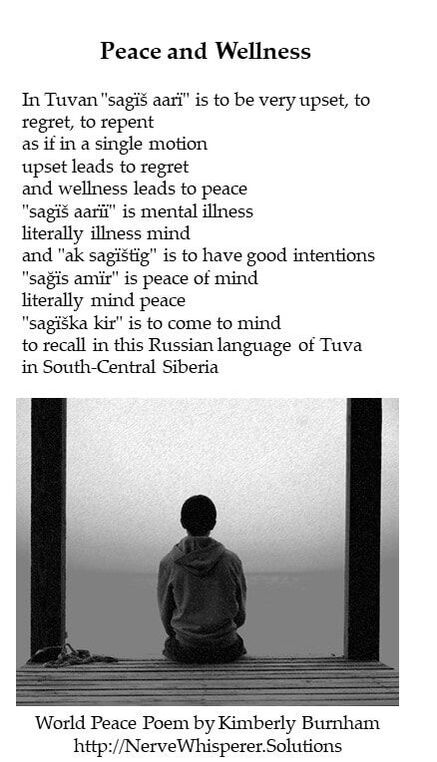
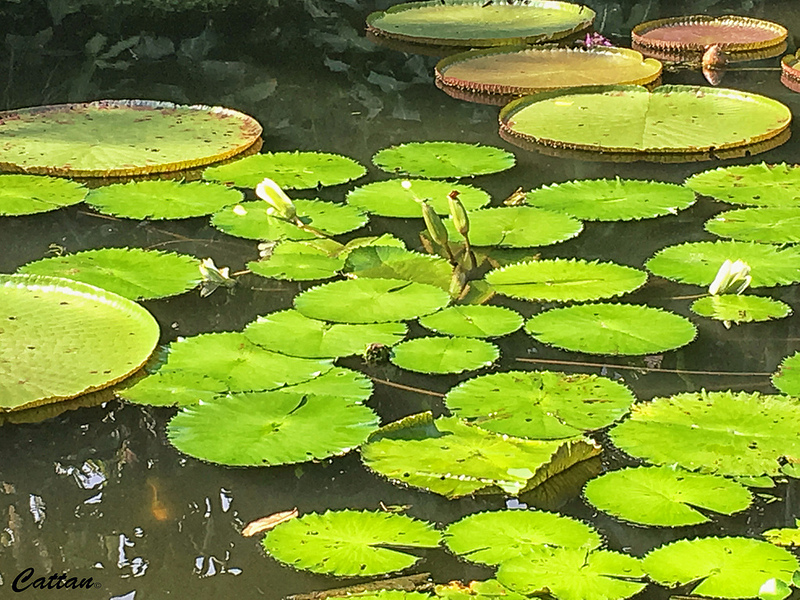
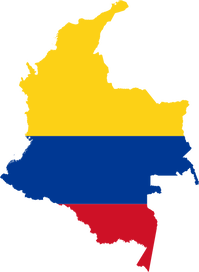
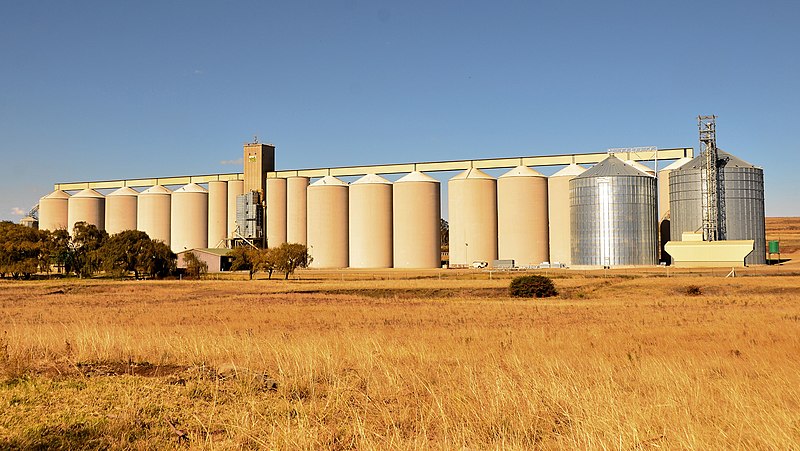
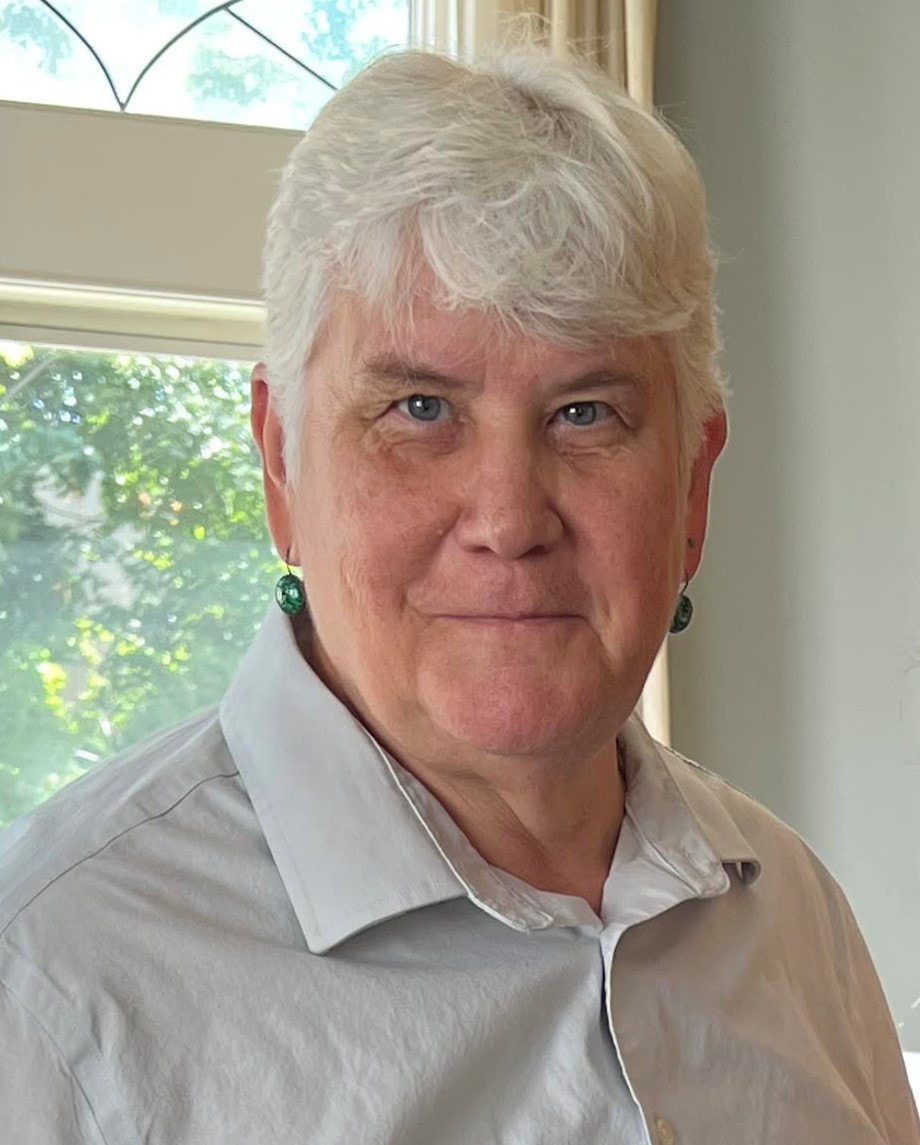
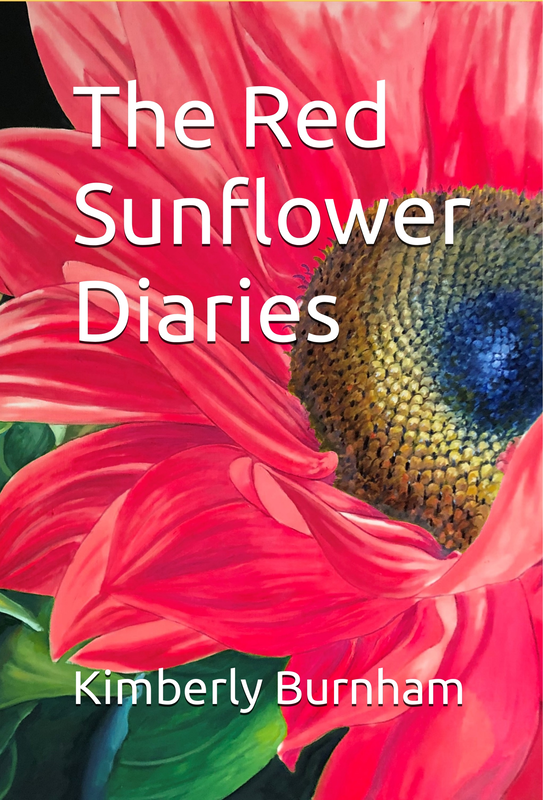
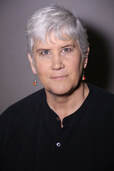

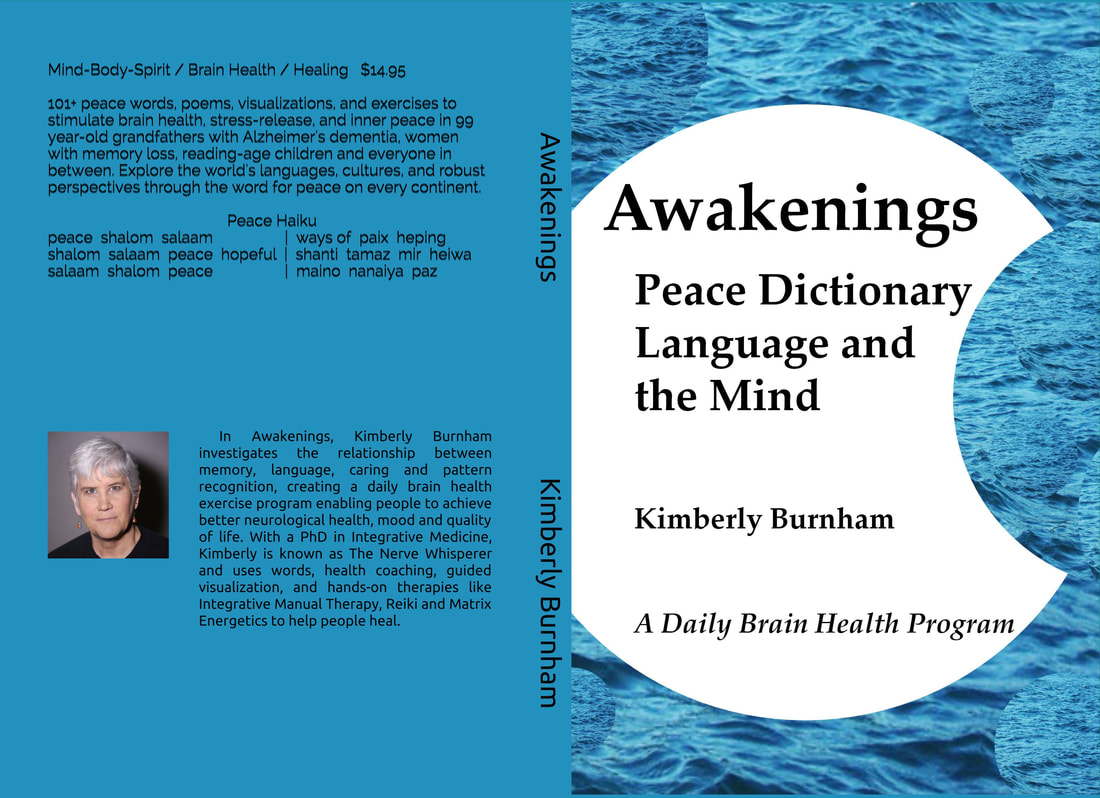
 RSS Feed
RSS Feed
